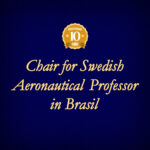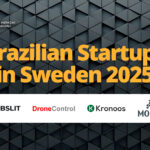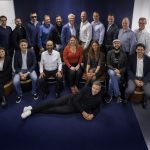A meeting at ITA rallied professors involved with the chairs programme jointly organised by the CISB, Saab, and Innovair three years ago. The meeting was an excellent opportunity to present the results of this initiative and discuss programme sustainability.

Three years ago, a Chair Programme was instituted at the Aeronautics Institute of Technology (ITA) for Swedish professors to cooperate with Brazil. The Swedish Endowed Professor Chairs at ITA in the Honor of Peter Wallenberg Sr has helped bring four renowned Swedish professors to the Aeronautical Institute of Technology and take several Brazilian researchers to different universities in Sweden with the aim of promoting research and the development of new technologies and establishing new partnerships.
Some of the results obtained so far were presented on October 3 during the Workshop on Swedish Professor Chair Program at ITA, organized by CISB and ITA as part of the CISB 7th Annual Meeting. Swedish professors and several Brazilian researchers attended the workshop, including Emilia Villani, of ITA, one the persons responsible for organising the workshop on behalf of ITA. “This type of project is essential to show that organisations are interested in long-term cooperation,” says Emilia. The opportunity serves to “encourage organisations that are already cooperating to continue investing and for those who are not cooperating to make contacts and initiate discussions, possibly resulting in joint research, development, and innovation projects,” she says.
“It was great to see the achievements of other professors and find out what they are working on in Brazil,” says professor Dan Henningson, of the Royal Institute of Technology (KTH), who holds a chair along with Petter Krus (Linköping University), Tomas Grönstedt, and Ragnar Larsson, both of Chalmers University. Larsson agrees with his Swedish colleague. “It was important to get together, review, and update the current state of our achievements. I had a feeling the other people involved also liked it very much,” he says.
At the end of the event, there was a round table between the programme representatives and the funding agencies FAPESP (The Research Foundation of the State of São Paulo) and FAPESC (The Research and Innovation Foundation of the State of Santa Catarina) to discuss cooperation between both countries. “This type of workshop is very important because it brings government representatives and companies together, not just researchers and professors,” says Henningson. “It’s great to see how this collaboration supports the highest level of universities and governments, and encourages everyone to continue the projects and work toward integrating the Brazilian and Swedish research communities,” he concludes. For Olivier Petit, who represented Grönstedt at the event, “the programme creates an important network between Brazilian and Swedish universities at all levels”.
Emilia already envisions the next steps. “As the results of the chairs and associated projects become known, I believe other actors will become interested in continuing and funding similar projects,” she says.




